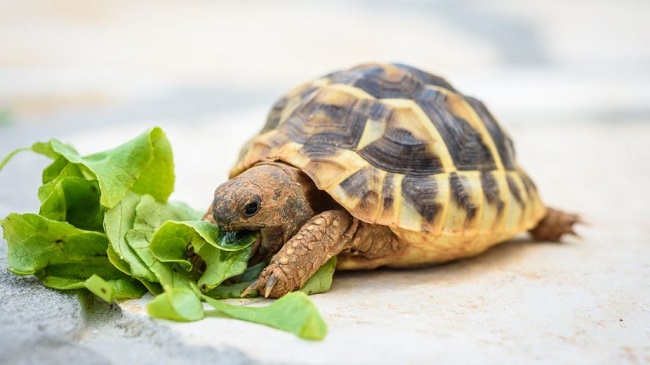Turtles, with their distinct shell-covered bodies and docile demeanors, have become popular pets worldwide. As turtle owners, it’s crucial to understand what foods these fascinating creatures can safely consume.
While turtles in the wild have a varied diet, pet turtles rely on their owners for a balanced and nutritious meal plan.
One question many turtle owners ask is, “What Human Foods Can Turtles Eat?” This article will delve into the specifics of a turtle-friendly diet from the human pantry.

Understanding a Turtle’s Dietary Needs
First and foremost, it’s essential to understand that turtles are not strictly herbivores or carnivores. They are, in fact, omnivores, meaning they eat both plants and meat.
The diet varies depending on the species, age, size, and health status of the turtle. Hence, a blend of both animal-based and plant-based foods is key to a balanced diet.
Fruits and Vegetables
Turtles can safely eat a variety of fruits and vegetables. Leafy greens like spinach, kale, and collard greens are packed with nutrients and form a crucial part of a turtle’s diet. Other veggies, including bell peppers, carrots, and zucchini, can also be given.
In terms of fruits, apples, bananas, melons, and berries can be offered in moderation, due to their high sugar content.
Proteins
Turtles also require protein in their diet, which can come from various sources. Cooked lean meats like chicken or turkey are acceptable in small quantities. Turtles can also eat fish, though it should be de-boned and cooked thoroughly to kill any potential parasites. Some turtles even enjoy shellfish like shrimp and prawns.
Grains
While grains shouldn’t form a significant part of a turtle’s diet, certain types can be offered occasionally. Cooked rice, pasta, and oats can be given in small portions. Always ensure they are unseasoned, as turtles cannot process salts and spices like humans.
Foods to Avoid
Certain human foods are harmful to turtles and must be avoided. These include processed foods, dairy products, fatty meats, and sweets. Avocados and onions are also toxic to turtles. Remember, any food not part of a turtle’s natural diet could cause health issues.
How to Feed Your Turtle Human Food
When feeding your turtle human food, always ensure it’s clean and fresh. Cut the food into small, manageable pieces for the turtle to consume easily. Additionally, rotate the types of food you offer to ensure a varied and balanced diet.
Importance of a Balanced Diet
Feeding your turtle a balanced diet is essential to its health and longevity. A diet that is rich in vitamins, minerals, and the right balance of protein, fruits, and vegetables will ensure your turtle remains healthy and active.
Conclusion
While human food can supplement a turtle’s diet, it’s crucial to research and consult with a vet or a turtle expert before introducing new foods. Not all human foods are safe or beneficial for turtles.
Always prioritize commercial turtle food, as it’s specifically formulated to meet their dietary needs. Human foods can supplement their diet but should never be the primary food source. After all, the key to a happy and healthy turtle is a well-balanced and nutritionally appropriate diet.
























